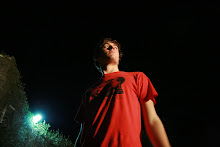When I went to the low-range Himalayas recently for a week, and I couldn't dare not bring my camera with me. A week in a remote place in India with snow-covered mountains in the background; how could I resist? Over the course of seven days, I took an estimated 515 photos with my camera. Any way you look at it, that's a lot of images, and a lot of time spent to take those images. I took the pictures because I wanted to, to see them in the future and remind myself of the time, to show those I love what its like there, and also, deep down, to prove that I had been there myself. Looking back at my pictures, I realized that a six dozen or so were taken of the Himalayan sunrise that I was fortunate to witness. When talking to a friend of mine, she ridiculed me, saying that I took too many pictures to stop and see the sunrise for myself. Though I had taken a lot of pictures, I made sure that I stopped to look at the sun hitting the peaks of the mountains and take it into my mind. Yet it made me think how, at times, I can be so focused with taking pictures that I am unaware of the beauty going on around me.
As cameras get cheaper, photography has become much more accessible to a wider range of individuals. Photographs come from all over the world, and seem to make it a smaller place. These same photographs are then distributed, compiled, and redistributed all over the world, making the value of certain images diminish. In fact, so many people now carry a camera around with them to take pictures simply to show that they can, making the entire action itself lose its meaning. Sontag also states in her book that the necessity to have our world confirmed by photography has become an addiction, breeding "image-junkies" from every corner of the globe.
Photo editing after the picture is taken has become an issue of hot debate in the world of photography. To many, using programs such as Photoshop or Picasa to edit your photos, potentially making them look completely different, is the same as a sprinter doping. Their argument is that nobody can tell the true talent of photographer anymore due to the extensive use of editing software. I don't use image editing programs myself, but that is because I am into the more natural look of my images, and I can also do all the photo manipulation I want with my camera. However, I realize that, if photographs are viewed from solely the perspective of art, photo editing is completely reasonable, if not necessary. Yet even I would like to believe that the amazing photographed images I see in modern art museums that I admire have not been touched up in some way.
Perhaps the most intriguing aspect of a photo, when it is not too altered by editing, is that an image cannot lie to you. The pictures that I take when I go somewhere have no opinion, no biased perspective. They allow people to imagine that they are experiencing the event or place pictured first-hand. Even the photographer doesn't experience the event fully themselves, as they are caught up in taking a picture, and even that is at a distance from the object, but they feel as if they are there. Photographs allow us to connect with our past and explore the present to the fullest extent. We can see what its like halfway across the world simply by looking at a photo. Or we can compare what we looked like in previous years to how we look now.
Taking pictures is one of my greatest hobbies, and my favorite works of art are usually photographs. At one time, I even aspired to be a photojournalist for National Geographic. As the saying goes, a picture truly has come to be worth a thousand words. It's up to the viewer whether those alleged words are a literary masterpiece or complete bullshit. Although I appreciate both the art and documentation aspects of photography, though, I have to realize that photographs are by no means everything. In order to prevent myself from buying into the addiction that Sontag speaks about, I must go and experience things for myself. Seeing and image of a place may well be enjoyable, but it is not venturing out and experiencing that place for oneself. No matter how much one may love photography, as I very well do, humanity must realize that seeing is not necessarily believing, and certainly not experiencing, the true reality this world offers.
Thank you to my love for the Sontag article.

No comments:
Post a Comment